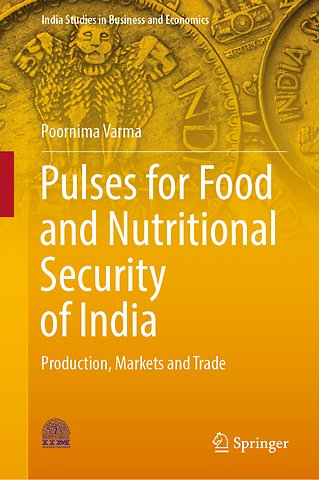Pulses for Food and Nutritional Security of India
Production, Markets and Trade
Samenvatting
This book provides an in-depth analysis of India’s pulses sector in terms of production, prices, markets, and trade. Pulses play a pivotal role in a developing country like India for all categories of people due to its rich protein content (double that of wheat and three times more than that of rice). Despite being an important crop from the point of view of food, nutrition, and environmental security, the focus of food security policies in developing countries has been more on wheat and rice production.
This book analyses factors influencing the supply of pulses with a greater emphasis on government interventions such as minimum support price (MSP) and National Food Security Mission (NFSM), the effectiveness of MSP and factors influencing farmers’ access to MSP, the import dependency implications through a detailed import pricing behavior of major importers of major pulses. It investigates production, market dynamics, and trade implications related to two major pulses, chickpea and pigeonpea, produced by all pulse-producing States in India. Analysis of farmer's awareness of MSP and factors influencing access to MSP are undertaken through a comprehensive household survey from the States of Maharashtra, Karnataka, and Madhya Pradesh. Finally, the book analyses import implications and import pricing behaviour for all major pulses imported by India.
The book would be very useful for researchers working on the issues of agricultural production and food security, for agriculture and agri-business students, as well as for policy makers to understand the inherent dynamics in the pulses sector.
Specificaties
Inhoudsopgave
Chapter Scheme<div><br></div><div><p>Chapter 2: An Overview of Pulses Economy </p>
Introduction<p></p>
Conclusion<br></div><div><br></div><div><p>Chapter 3: Pulses Production and Food security </p>
<p>Introduction<br>Production Technologies<br>The Need for Sustainable Practices</p><br></div><div><p>Chapter 4: Consumption of Pulses and Food Security </p><br></div><div><p>Introduction<br>Trends in the consumption of different types of pulses<br>Inter-state variation in consumption of Pulses<br>Rural Versus Urban Consumption<br>Conclusion</p><br><p></p><p>Chapter 5: National Food Security Mission and Pulses Production </p><p>Introduction<br>NFSM-Pulses Districts<br>Major Interventions<br>NFSM in Maharashtra<br>NFSM in Karnataka<br>NFSM in Madhya Pradesh </p><p><br></p><p>Chapter 6: Socio-Economic Profile of the Sample Households</p><p>Introduction<br>An Overview of Selected Study Areas<br>Socio-Economic Profile - an Overview<br>Socio-Economic Profile - District-Wise<br>Conclusion</p><p><br></p><p>Chapter 7: Pulses Production, Trade and Government Policies</p><p>Country Wise Imports of Major Pulses<br>Tariff Scenario<br>Conclusion</p><p><br></p><p>Chapter 8: Pricing and Exchange Rate Pass-through in Pulses Imports </p>Introduction<br>The concept of Pricing to Market and Exchange Rate Pass Through<br>Review of Literature and Theoretical Framework of the Study Model Specification<br>Data Description<br>Results and Discussion<br>Conclusion<p></p><p><br></p><p>Chapter 9: Minimum Support and Price Policies</p><p>An Overview of Government interventions in Agriculture<br>Minimum Support Prices Scheme<br></p><div>Procurement Policy and operations<br>E-NAM<br><div>Conclusion<br><div>Appendix</div><div><br></div></div></div><p></p><p>Chapter 10: Information and Utilisation of MSP: Major Determinants</p><p></p><div> <p>Introduction<br>Conceptual Framework<br>Model Specification<br>Description of Dependent and Explanatory Variables<br>Results and Discussion<br></p><div>Conclusion</div><div><br></div><p></p><p>Chapter 11: Supply Response of Major Pulses </p><p></p><div> <p>Introduction<br>Data<br>Results and Discussion<br>Conclusion </p><p><br></p><p>Chapter 12: Conclusion and Policy Implications<br></p><p><br></p></div></div></div>

